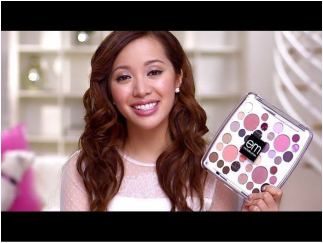
I feel for companies. From a business perspective, it’s hard to get people’s attention these days because of digital media. People no longer rely on one medium, such as a television or a magazine, to be exposed to products. They have various social networking sites, such as Groupon, Yelp, and FourSquare, to help them decide on which products to consume. One of the concepts that stood out the most from this topic is prosumers. Tapscott and Williams describes presumption as the blur between consumers and producers (p.125). People no longer just accept advertisements and buy products, but they actively participate in providing product feedback and even engage in product productions through social networking sites. This is good. It demonstrates people’s power, and Jenkins’ concept of participatory culture. However, although it is easy to see positive sides to prosumers, there are a few concerns of being prosumers that should be explored.
To demonstrate this point, I want to bring up an example of YouTube beauty gurus. They are prosumers because they often do vlogs about product usages and opinions. The problem can occur when they get sponsorships from companies and/or when they develop their own products. Sometimes, companies send products to these gurus in hopes that they will make a video about them. Companies like to use these gurus because they can target specific audience and are cheaper than making advertisements. Even though there are YouTube beauty gurus who provide honest reviews on products, they might hesitate to give negative reviews because they might not get another sponsors. This can affect them because some gurus make living out of making videos and getting sponsorships. And there are YouTube beauty gurus who make their own products. For example, Michelle Phan (see the pic below) is one of the most popular YouTube beauty gurus, and she collaborated with L’Oreal to produce her makeup line called “em.” Some fans loved it, but other fans criticize her for becoming mainstream and materialistic. Altogether, these incidents all question whether prosumers are all working for companies at the end. Through sponsorships and creating their products, they are losing their authentic voices. They are basically becoming one of them (as in companies who aim to make money). Yes, we live in a capitalistic society; however, I feel like as people become immerse in prosumption, it’s very easy to forget your true motives and selves. In doing so, they are producing and selling same messages to consumers. I personally don’t find anything new or original about Phan’s “em” line. Knowing that she is a YouTube beauty guru who started out as an underdog, I was expecting something more out of her. I think she’s promoting the same messages of consumerism and how beauty is important. I give her mad propz for self-managing her career, but there are so many flaws to her line (e.g., overpriced, same color, similar designs). I believe she lost her voice as a YouTube beauty guru who was trying to defend beauty consumers and express their opinions against corporate beauty companies.
Another problem to prosumption is that it can threaten people’s identities. In Brown’s article, he talked about a made identity, which is defined as “the one you create for yourself” (p.32). Being prosumers requires people to take on another identity. I’m sure many prosumers have other real jobs. I follow numerous YouTube beauty gurus, and not all of them make YouTube videos for living. Thus, since they have virtual and real identities, and these identities intersect, how would they manage to distinguish their authentic self? Some YouTube beauty gurus are young as high school students. For these young people whose identities are growing and constantly constructed, wouldn’t they have a harder time to discover their true identity? Are they training themselves to become materialistic at an early age?
I guess my overall concern is that without proper guidance, being prosumers can be a way to lose one’s self into a materialistic world. One can argue that prosumption is a way to fight against companies and provide honest feedback to consumers. However, at the time, it’s easy to become one of them. Thus, how can we protect our authentic selves and protect ourselves from becoming corporatized when there are so many temptations (video views, sponsorships, likes)? I’m sure these questions do not have clear-cut answers, and they can illustrate that digital media can be a gray area for people.
To demonstrate this point, I want to bring up an example of YouTube beauty gurus. They are prosumers because they often do vlogs about product usages and opinions. The problem can occur when they get sponsorships from companies and/or when they develop their own products. Sometimes, companies send products to these gurus in hopes that they will make a video about them. Companies like to use these gurus because they can target specific audience and are cheaper than making advertisements. Even though there are YouTube beauty gurus who provide honest reviews on products, they might hesitate to give negative reviews because they might not get another sponsors. This can affect them because some gurus make living out of making videos and getting sponsorships. And there are YouTube beauty gurus who make their own products. For example, Michelle Phan (see the pic below) is one of the most popular YouTube beauty gurus, and she collaborated with L’Oreal to produce her makeup line called “em.” Some fans loved it, but other fans criticize her for becoming mainstream and materialistic. Altogether, these incidents all question whether prosumers are all working for companies at the end. Through sponsorships and creating their products, they are losing their authentic voices. They are basically becoming one of them (as in companies who aim to make money). Yes, we live in a capitalistic society; however, I feel like as people become immerse in prosumption, it’s very easy to forget your true motives and selves. In doing so, they are producing and selling same messages to consumers. I personally don’t find anything new or original about Phan’s “em” line. Knowing that she is a YouTube beauty guru who started out as an underdog, I was expecting something more out of her. I think she’s promoting the same messages of consumerism and how beauty is important. I give her mad propz for self-managing her career, but there are so many flaws to her line (e.g., overpriced, same color, similar designs). I believe she lost her voice as a YouTube beauty guru who was trying to defend beauty consumers and express their opinions against corporate beauty companies.
Another problem to prosumption is that it can threaten people’s identities. In Brown’s article, he talked about a made identity, which is defined as “the one you create for yourself” (p.32). Being prosumers requires people to take on another identity. I’m sure many prosumers have other real jobs. I follow numerous YouTube beauty gurus, and not all of them make YouTube videos for living. Thus, since they have virtual and real identities, and these identities intersect, how would they manage to distinguish their authentic self? Some YouTube beauty gurus are young as high school students. For these young people whose identities are growing and constantly constructed, wouldn’t they have a harder time to discover their true identity? Are they training themselves to become materialistic at an early age?
I guess my overall concern is that without proper guidance, being prosumers can be a way to lose one’s self into a materialistic world. One can argue that prosumption is a way to fight against companies and provide honest feedback to consumers. However, at the time, it’s easy to become one of them. Thus, how can we protect our authentic selves and protect ourselves from becoming corporatized when there are so many temptations (video views, sponsorships, likes)? I’m sure these questions do not have clear-cut answers, and they can illustrate that digital media can be a gray area for people.
